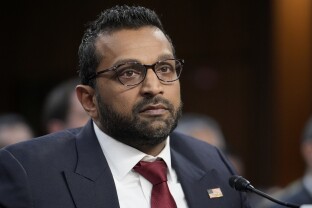FBI Director Kash Patel has a lot on his plate.
Including donuts.
Patel recently purchased up to $50,000 worth of Krispy Kreme stock, according to a personal stock transaction document he filed with the Office of Government Ethics.
In a disclosure to the ethics office, Patel said that “no current conflict exists” between his Krispy Kreme investment and his work leading the nation’s preeminent federal law enforcement agency.
“Recusal or divestiture will occur should one arise,” Patel added.
But Patel became a Krispy Kreme stockholder in May, immediately before the North Carolina-based company found itself the target of ongoing shareholder lawsuits related to a 2024 data breach that exposed the personal data of more than 160,000 people. Krispy Kreme did not respond to a request for comment.
A ransomware group known as Play took credit for the Krispy Kreme data breach, and the FBI in June issued an advisory indicating that it’s investigating Play for suspected criminality.
Around the same time he bought Krispy Kreme stock, Patel also purchased up to $100,000 worth of stock in ON Semiconductor, which manufactures a variety of power modules, sensors and memory chips.
Patel’s stock investments add to an eventful few months for the FBI leader. Patel finds himself grappling with a recruiting controversy, Epstein Files congressional testimony and his girlfriend suing a former agent for defamation, on top of the day-to-day burden of leading the bureau.
His Krispy Kreme stock purchase came on a day the stock closed at $3.17 a share, one of its lowest points this decade; it closed at $3.34 on Tuesday. Patel purchased ON Semiconductor on a day it closed at $44.62; it closed at $48.94 on Tuesday.
Patel’s Krispy Kreme and ON Semiconductor stock purchases coincided with him dumping more than 40 other financial assets, including stock shares in companies such as Intel Corp., fellow chip maker NVIDIA Corp., computer giant Apple Inc., defense contractor Palantir Technologies, heavy equipment manufacturer Caterpillar Inc., conservative video and web hosting platform Rumble Inc. and Facebook parent Meta, according to a financial trade disclosure.
Patel also resigned from positions with several corporate entities, including the Trump Media and Technology Group and the news organization Epoch Times.
He did so to adhere to conflicts of interest law and “avoid any actual or
apparent conflict of interest,” according to an ethics agreement Patel signed Jan. 28 and certified on May 28.
The FBI’s public affairs office acknowledged NOTUS’ request for comment but didn’t respond to emailed questions.
“If I was the FBI director, I would not trade individual stocks and would go out of my way to avoid any possibility of a conflict or the appearance of a conflict,” said Morris Pearl, chair of Patriotic Millionaires, a coalition of wealthy Americans who advocate for government policies that favor working- and middle-class Americans. “It almost seems like they’re doing these stock trades to make a point that they can flout the rules and say they’re above the law.”
Pearl, a former managing director of investment house BlackRock, added that “any company might have some dealing with the FBI or Justice Department,” which should prompt FBI leaders to divest individual stocks in favor of money market or broad-based mutual funds.
Current law gives Patel and other executive branch leaders leeway with their personal finances. The Ethics in Government Act requires executive branch officials to publicly disclose their personal financial holdings, but they may continue to hold and even trade individual stocks as long as the stock holdings don’t overtly conflict with their government work.
The president and vice president have even greater freedom, as they may legally invest their personal wealth largely as they see fit. For example, President Donald Trump last month reported buying more than $100 million worth of corporate, state and municipal bonds since taking office in January — including bonds from several banks and tech companies such as Wells Fargo and Meta, which together spend tens of millions of dollars annually to influence the government.
There’s a bipartisan movement in Congress to ban federal lawmakers and their immediate family members from trading individual stocks, in part because dozens of lawmakers have violated the disclosure provisions of the existing Stop Trading on Congressional Knowledge Act.
In June, one of several bills aiming at this goal advanced out of a Senate committee.
A major sticking point: Whether such a bill should apply to the executive branch, up to and including the president and vice president. Republican Sen. Josh Hawley of Missouri, for one, wants it to, but other lawmakers fear that including the executive branch in a Congress-focused stock-ban bill will amount to a poison pill that kills the bill.
—
This story was produced as part of a partnership between NOTUS and The Assembly.
Sign in
Log into your free account with your email. Don’t have one?
Check your email for a one-time code.
We sent a 4-digit code to . Enter the pin to confirm your account.
New code will be available in 1:00
Let’s try this again.
We encountered an error with the passcode sent to . Please reenter your email.


